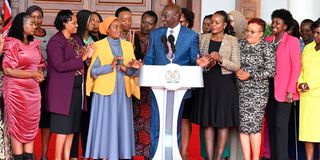Breaking barriers: Countries leading the way in gender-equal governance

President William Ruto during a meeting with women leaders on the rising cases of femicide in the country at State House, Nairobi, on November 20, 2024.
What you need to know:
- Despite international frameworks, most countries lag behind in women’s political representation, with only a few successfully closing the gender gap.
- Global commitments like Cedaw and the Beijing Declaration push for women’s leadership, yet only a few nations have achieved gender equality.
In 1990, the Economic and Social Council reaffirmed the Convention on the Elimination of All Forms of Discrimination against Women’s provision on inclusion in governance, recommending that women occupy at least 30 per cent of leadership positions by 1995 and 50 per cent by 2000.
This push for gender inclusivity was further reinforced by the Beijing Declaration and Platform for Action in 1995, which laid out detailed strategies to ensure women's full participation in governance.
The African Charter on Democracy, Elections and Governance, adopted in 2007, echoed these principles by mandating state parties to create environments conducive to women’s active participation in decision-making.
Despite these global commitments, progress has been inconsistent. Only a handful of countries have achieved gender parity. Notably, these nations rank among those with the narrowest gender inequalities in the world. Do you know any? Find out here.


